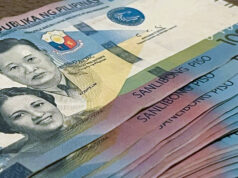PHL returns to ‘panda’ bond mart
THE PHILIPPINES returned to China’s bond market on Wednesday after more than a year, offering 2.5 billion renminbi ($363.3 million) in three-year papers amid perceived strong investor demand.
Following the regular Treasury bond auction, Deputy Treasurer Erwin D. Sta. Ana told reporters: “… today we are returning to the panda market.”
“We are pricing, as we speak, the 2.5 billion RMB issue… this is going to be through an auction process, and as we speak the auction is ongoing in Beijing,” Mr. Sta. Ana said, adding that the issue should have been priced by 2:30 p.m.
“I cannot speak yet because I don’t see the book personally, but I’ve been hearing encouraging news about how the book is turning out.”
There was no update from the Bureau of the Treasury as of early Wednesday evening. The three-year debt papers will be settled on Monday, May 20.
The latest “panda” debt sale would be bigger than the 1.46-billion RMB ($230 million) bonds sold by the Philippines in March last year in its first bond offer in China’s market. Those maiden three-year papers fetched a five percent coupon. China-based debt watcher Lianhe Credit Rating Co. Ltd gave the bonds offered last year an “AAA” top rating and stable outlook, citing the “lowest expectation of default risk.”
The Philippines, one of Asia’s most active sovereign bond issuers, plans to borrow P1.189 trillion this year, 75% of which will be sourced domestically while the balance will be from foreign creditors. This will be used to fund a budget deficit programmed at P624.4 billion, equivalent to 3.2% of gross domestic product, and support increased government spending programmed at P3.774 trillion.
Last week, the government raised €750 million in eight-year global bonds with a 0.875% coupon and priced 70 basis points over benchmark. That offer involved the first euro-denominated bonds issued by the Philippines in more than a decade.
In January, the Philippines sold $1.5 billion in 10-year offshore dollar bonds.
The government is also looking at offering “samurai” bonds amounting to $1-1.5 billion in yen equivalent some time next semester, as well as another round of dollar-denominated global bonds. — Karl Angelo N. Vidal



